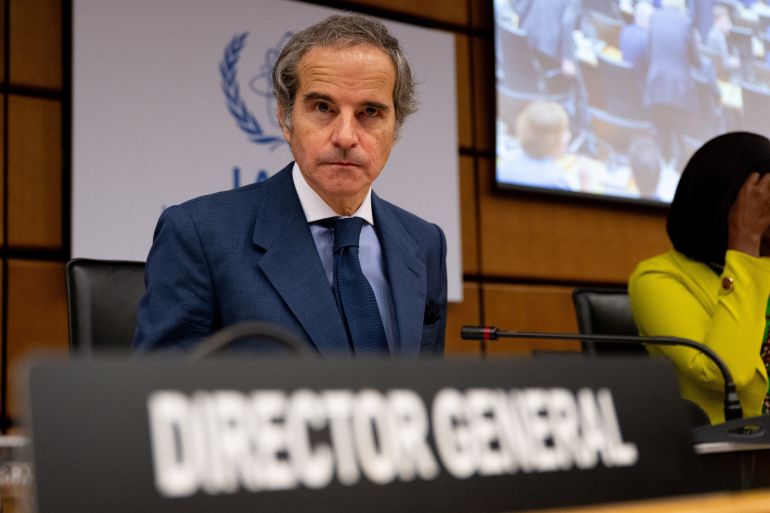IAEA warns Israel-Iran conflict threatens nuclear facilities, diplomacy
Rafael Grossi. head of UN’s nuclear watchdog, warns Israeli conflict with Iran ‘threatens lives’ and risks nuclear fallout.

Published On 16 Jun 202516 Jun 2025
The head of the International Atomic Energy Agency (IAEA), Rafael Grossi, has warned that escalating hostilities between Israel and Iran, now in a fourth day, pose grave dangers to diplomacy and nuclear safety and has urged all parties to exercise maximum restraint.
Speaking at an emergency session of the United Nations nuclear watchdog’s Board of Governors on Monday in Vienna, Director General Grossi stressed that the region is at a critical juncture.
Recommended Stories
list of 3 items
Photos of the escalating Israel-Iran conflict
end of list
“Military escalation threatens lives, increases the chance of a radiological release with serious consequences for people and the environment, and delays indispensable work towards a diplomatic solution for the long-term assurance that Iran does not acquire a nuclear weapon,” Grossi said.
The IAEA chief’s remarks came amid growing concern that the conflict could permanently damage efforts to revive nuclear talks with Tehran, already strained by years of mistrust and United States President Donald Trump’s torpedoing of the 2015 nuclear accord brokered by world powers with Iran.
Nuclear sites damaged
Grossi also delivered a technical update on the status of Iranian nuclear facilities after Israeli bombardments.
Natanz, Iran’s main uranium enrichment plant, was among the sites hit on Friday. While its underground section was spared a direct strike, Grossi warned that vital equipment may have been damaged due to a power outage triggered by the attack.
He noted that radiation levels outside the facility remained normal and, critically, there was no evidence of contamination spreading beyond the site.
Advertisement
“The level of radioactivity outside the Natanz site has remained unchanged and at normal levels, indicating no external radiological impact to the population or the environment from this event,” he said.
In addition to Natanz, four nuclear installations in Isfahan province were also damaged. However, the Fordow enrichment site, the Bushehr nuclear power plant and a reactor still under construction appeared unaffected.
IAEA personnel remain on the ground in Iran and are ready to resume full monitoring once the security situation allows, Grossi said.
Meanwhile, Iran’s government is facing pressure at home to take a harder line. A bill reportedly being prepared in parliament could pave the way for Iran to exit the Treaty on the Non-Proliferation of Nuclear Weapons, a move that would deal a severe blow to global nonproliferation efforts.
Ministry of Foreign Affairs spokesperson Esmaeil Baghaei said the draft legislation was still in its early stages and would require coordination with lawmakers. He reiterated Tehran’s longstanding official opposition to developing nuclear weapons.
